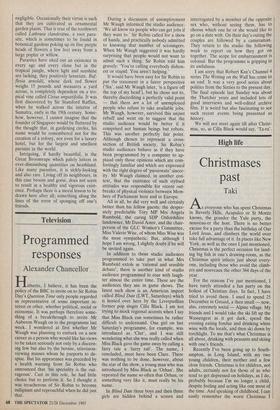Television
Programmed responses
Alexander Chancellor
Hitherto, I believe, it has been the policy of the BBC to invite on to Sir Robin Day's Question Time only people regarded as representative of some important in- terest or other, whether political, social or economic. It was perhaps therefore some- thing of a breakthrough to invite Mr Auberon Waugh on to the programme last week. I wondered at first whether Mr Waugh was planning to embark on a new career as a person who would like his views to be taken seriously not only by a discern- ing few but also by the bovine, television- viewing masses whom he purports to de- spise. But his appearance was preceded by a health warning from Sir Robin who announced that 'his speciality is the out- rageous'. Cast in this role, he had little choice but to perform it. So I thought it was treacherous of Sir Robin to become indignant and reproachful when he did just that.
During a discussion of unemployment Mr Waugh informed the studio audience: `We all know six people who can get jobs if they want to.' Sir Robin called for a show of hands, and practically nobody admitted to knowing that number of scroungers. When Mr Waugh suggested it was hardly surprising that people would not want to admit such a thing, Sir Robin told him gravely: 'You're calling everybody dishon- est or stupid. You aren't helping.'
It would have been easy for Sir Robin to put the statement in a fairer perspective (`Six', said Mr Waugh later, `is a figure off the top of my head'), but he chose not to, thereby discrediting a perfectly valid point — that there are a lot of unemployed people who refuse to take available jobs. Mr Waugh, however, survived this unjust rebuff and went on to suggest that the studio audience would be better if it comprised not human beings but robots. This was another perfectly fair point. Although chosen to represent a cross- section of British society, Sir Robin's studio audiences behave as if they have been programmed by a computer to ap- plaud only those opinions which are com- fortingly familiar and which are expressed with the right degree of `passionate' sincer- ity. Mr Waugh claimed, in another con- text, that the existence of such stylised attitudes was responsible for recent out- breaks of physical violence between Mem- bers of Parliament here and in Europe.
All in all, he did very well and certainly better than his fellow guests: the desper- ately predictable Tory MP Mrs Angela Rumbold, the caring SDP Oxfordshire landowner, Mr David Astor, and the chair- person of the GLC Women's Committee, Miss Valerie Wise, of whom Miss Wise was the most sympathetic. But, although I hope I am wrong, I slightly doubt if he will be invited again.
In addition to those studio audiences programmed to take part in what Mrs Rumbold extols as `rational and sensible debate', there is another kind of studio audience programmed to roar with laugh- ter almost the entire time. These are the audiences they use in game shows. The latest such show is an American import called Blind Date (LWT, Saturdays) which is hosted over here by the Liverpudlian former pop singer Cilla Black. I am not trying to mock regional accents when I say that Miss Black can sometimes be rather difficult to understand. One girl on last Saturday's programme, for example, was introduced as `Clue, and I was still wondering what she was really called when Miss Black gave the game away by calling a fairy tale a `furry tail'. The name, I concluded, must have been Clare. There was nothing to be done, however, about the star of the show, a young man who was introduced by Miss Black as `Orhan'. She repeated the name so often that Orhan, or something very like it, must really be his name.
In Blind Date three boys and then three girls are hidden behind a screen and interrogated by a member of the opposite sex who, without seeing them, has to choose which one he or she would like to go on a date with. On their day's outing the couples are followed by a cameraman. They return to the studio the following week to report on how they got on together. The scope for embarrassment is colossal. But the programme is gripping in its awfulness.
I am sorry that Robert Kee's Channel 4 series The Writing on the Wall has come to an end. It was a very good series about politics from the Sixties to the present day. The final episode last Sunday was about the Thatcher years and included lots of good interviews and well-edited archive film. It is weird but also fascinating to see such recent events being presented as history.
We will not meet again till after Christ- mas, so, as Cilla Black would say, `Ta-ra'.


















































































 Previous page
Previous page